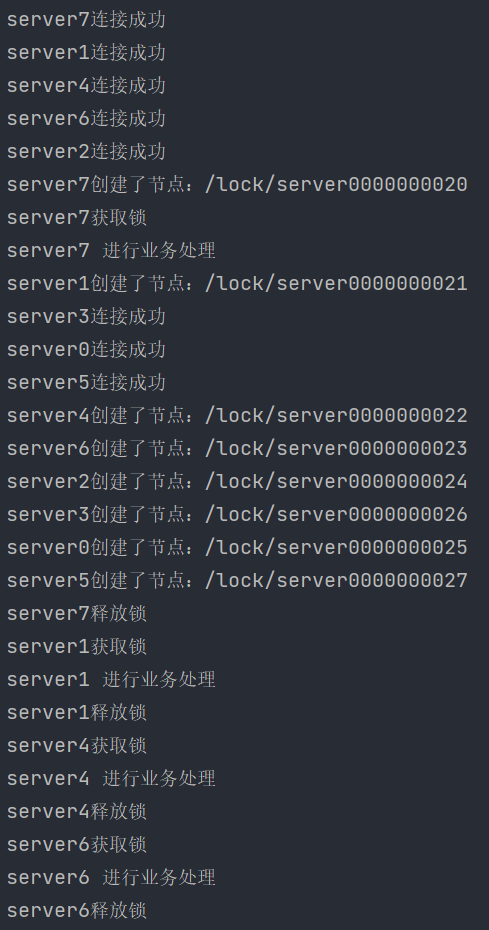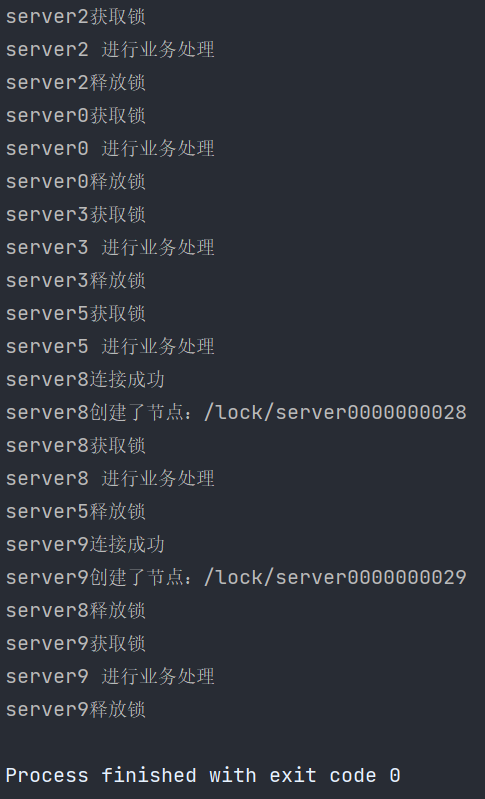案例:分布式锁
PPG007 ... 2021-12-28 About 2 min
# 案例:分布式锁
# 案例描述
程序启动后以临时有序节点注册到 ZooKeeper 集群中,注册完毕后判断自己的编号是否是所有节点中最小的,若是,则继续执行业务代码,否则监听等待,知道自身编号是最小。
# 编码
public class LockServer {
private ZooKeeper zooKeeper;
private static final String CONNECT_STR="150.158.153.216:2181,39.107.112.172:2181,115.28.211.227:2181";
private static final int TIMEOUT=200000;
private final String serverName;
private final CountDownLatch countDownLatch=new CountDownLatch(1);//辅助类,用于获取锁后唤醒业务方法
int time=0;//计数器,用于控制输出,避免多次输出同一内容
private String path=null;//当前节点全路径
public LockServer(String serverName) {
this.serverName = serverName;
}
public static void main(String[] args) {
ThreadPoolExecutor threadPoolExecutor = new ThreadPoolExecutor(Runtime.getRuntime().availableProcessors()
, 2 * Runtime.getRuntime().availableProcessors()
, 10
, TimeUnit.SECONDS
, new ArrayBlockingQueue<>(5),
new ThreadPoolExecutor.CallerRunsPolicy());//创建线程池
for (int i = 0; i < 10; i++) {
int finalI = i;
threadPoolExecutor.execute(()->{
LockServer server = new LockServer("server"+ finalI);
server.init();
});
}
while (threadPoolExecutor.getActiveCount()!=0){
Thread.yield();//等待所有线程结束
}
threadPoolExecutor.shutdownNow();//关闭线程池
}
public void init(){
this.connect();
this.register();
this.process();
}
private void register() {
try {
path=zooKeeper.create("/lock/server",serverName.getBytes(), ZooDefs.Ids.OPEN_ACL_UNSAFE, CreateMode.EPHEMERAL_SEQUENTIAL);//创建带序号节点
System.out.println(serverName+"创建了节点:"+path);
} catch (KeeperException | InterruptedException e) {
e.printStackTrace();
}
}
private void process() {
try {
countDownLatch.await();//等待获取锁
System.out.println(serverName+" 进行业务处理");
TimeUnit.SECONDS.sleep(5);//模拟业务处理
} catch (InterruptedException e) {
e.printStackTrace();
}finally {
remove();//处理完移除节点,释放锁,虽然创建的是临时节点,但为了保险还是手动释放
}
}
private void remove() {
try {
zooKeeper.delete(this.path,-1);//释放节点
path=null;
System.out.println(serverName+"释放锁");
} catch (InterruptedException | KeeperException e) {
e.printStackTrace();
}
}
private void connect() {
try {
zooKeeper=new ZooKeeper(CONNECT_STR,TIMEOUT,watchedEvent -> {
if (watchedEvent.getState().equals(Watcher.Event.KeeperState.SyncConnected)&&time==0){//只输出一次连接成功提示
System.out.println(serverName+"连接成功");
++time;
}
try {
List<String> children = zooKeeper.getChildren("/lock", true);
Collections.sort(children);
if (children.get(0)!=null&&children.get(0).equals(path.substring("/lock/".length()))&&time==1){
System.out.println(serverName+"获取锁");
countDownLatch.countDown();//唤醒业务方法,且只唤醒一次
++time;
}
} catch (KeeperException | InterruptedException e) {
e.printStackTrace();
}
});
} catch (IOException e) {
e.printStackTrace();
}
}
}
1
2
3
4
5
6
7
8
9
10
11
12
13
14
15
16
17
18
19
20
21
22
23
24
25
26
27
28
29
30
31
32
33
34
35
36
37
38
39
40
41
42
43
44
45
46
47
48
49
50
51
52
53
54
55
56
57
58
59
60
61
62
63
64
65
66
67
68
69
70
71
72
73
74
75
76
77
78
79
80
81
82
83
84
85
86
87
88
89
90
91
92
93
94
95
96
97
98
99
100
101
2
3
4
5
6
7
8
9
10
11
12
13
14
15
16
17
18
19
20
21
22
23
24
25
26
27
28
29
30
31
32
33
34
35
36
37
38
39
40
41
42
43
44
45
46
47
48
49
50
51
52
53
54
55
56
57
58
59
60
61
62
63
64
65
66
67
68
69
70
71
72
73
74
75
76
77
78
79
80
81
82
83
84
85
86
87
88
89
90
91
92
93
94
95
96
97
98
99
100
101
# 测试结果


通过结果发现,获取锁的顺序确实是按照创建节点的序号大小进行的。